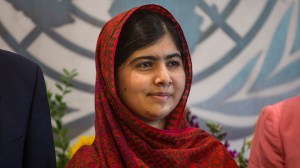The Nobel Peace Prize was awarded Friday to India’s Kailash Satyarthi and Pakistan’s Malala Yousafzai for their struggles against the suppression of children and for young people’s rights, including the right to education.

Thorbjorn Jagland, chairman of the Norwegian Nobel Committee, said, “Children must go to school, not be financially exploited.”
Yousafzai came to global attention after she was shot in the head by the Taliban — two years ago Thursday — for her efforts to promote education for girls in Pakistan. Since then, after recovering from surgery, she has taken her campaign to the world stage.
Through her heroic struggle, she has become a leading spokeswoman for girls’ rights to education, said Jagland.
According to the Nobel committee, at 17 she’s the youngest ever peace prize winner.
Meanwhile, Satyarthi, age 60, has shown great personal courage in heading peaceful demonstrations focusing on the grave exploitation of children for financial gain, the committee said.
“The Nobel Committee regards it as an important point for a Hindu and a Muslim, an Indian and a Pakistani, to join in a common struggle for education and against extremism,” it said.
“It has been calculated that there are 168 million child labourers around the world today. In 2000 the figure was 78 million higher. The world has come closer to the goal of eliminating child labour.”
‘Absolutely thrilled’
Nigel Chapman, chief executive of the Plan International aid organization, welcomed the award, saying it brought a “fantastic glow” to his heart.
“I think anybody who’s interested in campaigning for children’s rights is absolutely thrilled by this news,” he said, speaking to CNN from New York.
“It’s often hard to get these issues at the top of the agenda, and the fact that these two really important figures have been honored today is terrific news.”
Chapman praised the Nobel committee for its smart move in awarding the prize jointly to Yousafzai and Satyarthi, who are “two major heroes” in their countries.
The issues of education and child labor are intimately linked together, he said, “because one of the reasons that girls in particular don’t go to school is because they are working, often in difficult and dangerous circumstances, trying to earn money for their families.”
There are still 65 million girls worldwide who are not in school, he said. Millions start lessons but drop out for reasons including having to work or being forced to marry very young.
He said it was also a great boost for campaigners on the eve of the International Day of the Girl.
On his Twitter feed, Satyarthi says that education is impossible without ending child labor.
The corporate world “must realise child labour & denial of education is biggest impediment in sustainable economic growth & industrial development,” reads a tweet from last week.
Prerequisite for peace
The Norwegian Nobel Committee makes the point that 60% of the current population is under 25 years of age in the poorest countries of the world.
“It is a prerequisite for peaceful global development that the rights of children and young people be respected,” it said.
“In conflict-ridden areas in particular, the violation of children leads to the continuation of violence from generation to generation.”
Yousafzai was among the favorites for the prize last year, which instead went to the Organisation for the Prohibition of Chemical Weapons, for its longstanding efforts to “do away with a whole category of weapons of mass destruction.”
The Norwegian Nobel Committee received a record 278 nominations for the 2014 prize, 47 of which were for organizations.
Each prize carries with it a monetary reward of 8 million Swedish kronor (about $1.1 million) to be divided among the winners.















